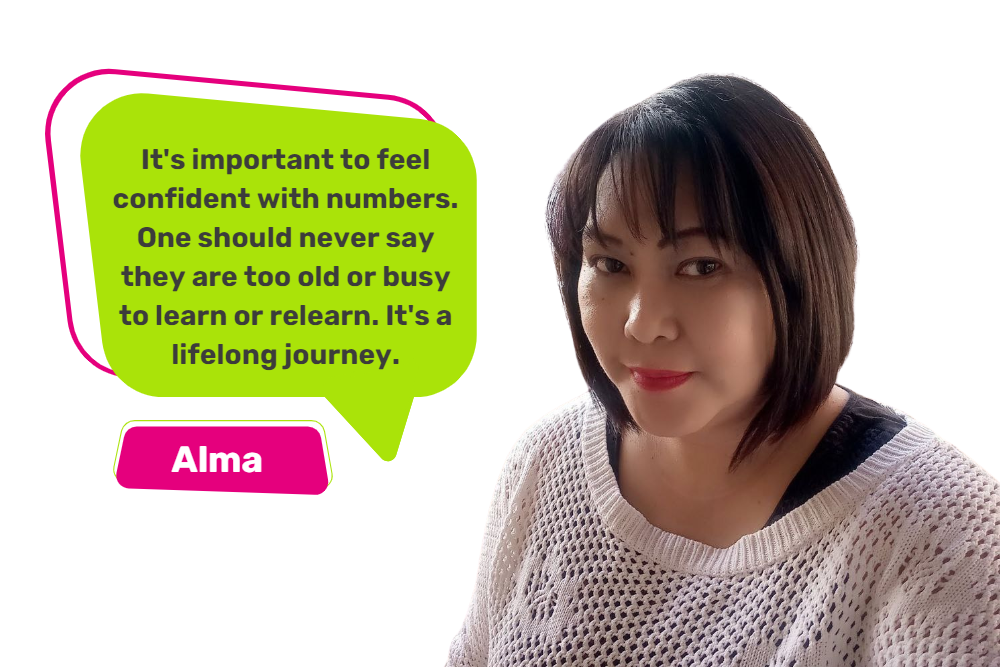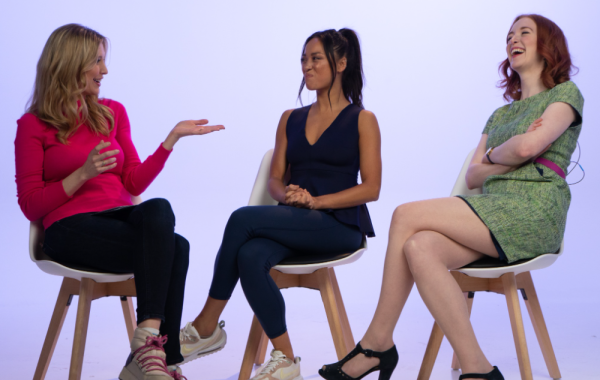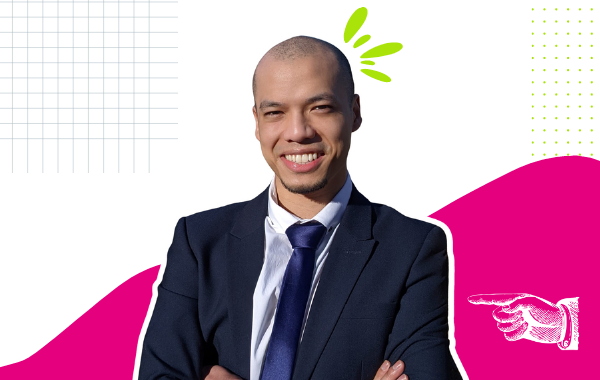The best word to describe how I used to feel about maths is ‘scared.’ I grew up in the Philippines and I think the education I received there made me feel this way.
In class, we were just focused on getting the answers to maths questions correctly and quickly. If I couldn’t raise my hand to give the answer fast enough or if my answer was wrong, I would feel inadequate; only my classmates who got the answers correct were praised.
My lack of confidence made me feel scared to even attempt to solve a maths problem because it would just revive that feeling of shame and incompetence.
After university I came to the UK with my family in 2009 and during lockdown I worked as a freelance tutor teaching functional skills, including English and maths, online to adult students. I was teaching Polish learners who were living in the UK and wanted to improve their English and numeracy skills.
It was tough as I was already teaching what for me was a difficult subject – maths – and doing it remotely while dealing with technology was a challenge.
Overcoming negative feelings about maths
I then began working for Links2Work teaching functional skills maths again. I learnt about National Numeracy’s Becoming a Numeracy Champion training through Ealing Council. I thought it sounded interesting and might be something that I could learn from and that could help with my class. I wanted to improve my knowledge of teaching maths in an effective and simple way.
At school it was really belittling because if you weren’t very good at maths you would sit at the front so everyone could see who was poor at it, but the numeracy training showed me it wasn’t too late to overcome my negative feelings.
We talked about maths anxiety and I realised I was not alone.
When everyone started talking about their feelings I also opened up about my experience and didn’t feel humiliated. It opened some wounds, but it was therapeutic eventually. Because of the discussions, the wounds started to heal little by little and I felt it was OK to be anxious and it wasn’t the end of the world.
Numeracy at work
Now, I am a Curriculum and Delivery Manager, which means I create schemes of work, am involved in training tutors, sharing resources, overseeing their classes and supporting them, as well as occasionally teaching adult learners myself.
We help adults who do not have minimum numeracy or literacy skills at Level 2, by providing classes in order to improve their life chances at getting into work or university, or to move into a different career. We work with and support local communities, including Polish, South Asian and Ukrainian, and help them integrate and improve their life prospects.
The Becoming a Numeracy Champion training has helped me in my role as I’ve been able to use National Numeracy resources to teach functional skills maths. The website resources have been very useful, especially the videos and tutorials – for example, the students easily learnt about fractions with the slices of pizza explanation.
Get numeracy resources for work
Taking on the National Numeracy Challenge
I found the concept of the National Numeracy Challenge amazing. I liked it that you were not being timed or put under pressure, which eased the tension and focused the mind more on solving the problem, rather than feeling like you are in a race as I did when I was at school.
If you get any questions wrong it tells you how to figure out the correct answer and I like the information given after the quick check, telling you what level you’re at and what it means. You have the chance to do more practice and there are useful links and resources to help continue your learning.
I’ve since encouraged our tutors and partner organisations to sign up to Becoming a Numeracy Champion training too and suggested resources they can use in their classes, the National Numeracy website is a good additional support mechanism.
Using numbers in everyday life
I had given up when it came to maths, but I have learnt I have the patience to learn it!
Now I feel there is no more negative voice in my head saying: ‘No, you can’t do that, just give up and give it to your son!’ I don’t need to feel anxious about it and I have that patience and resilience to think: ‘Focus and you can do it.’ I feel confident and competent now and no longer engage in self-deprecating thoughts.
I use numeracy every day: at work I calculate the number of students who pass or fail assessments and when I visit different learning sites I can work out the distance and time to get from one site to another. At home I use a machine to read my blood pressure and I can also regulate the time and temperature for cooking food in my air fryer.
I also use numeracy to manage money, calculate my income and understand my payslip. My new confidence with numbers has been very useful in applying it to daily life tasks. Every time I saw numbers before, I would leave it with my son, but he is at university now and I can just do it on my own, without having to call him.
I meet up with my high school friends on Zoom from time to time and when I mentioned that I am now teaching maths they were surprised and said: ‘What, you are teaching maths?!’ They couldn’t believe it!
I still make mistakes though: I recently checked my blood pressure but didn’t see that the machine was set up in kPa, which is kilopascal, and not mmHg, which is millimetres of mercury. I didn’t see the decimal point either so when I looked at the reading I panicked, thinking I might be having a hypertension crisis and would have to go to the Emergency Department! When I looked again and realised it was set to kPa and not mmHg I felt really silly. I realised it wasn’t such a big deal and had to calm down otherwise it would make my reading worse!
Supporting others on their numeracy journey
I am part of an employment community group at my church and we’re planning to create a group of students to learn maths at weekends. I hope to spread the word about this amazing concept of overcoming maths anxiety and help others continue to benefit from National Numeracy’s efforts.
To anyone thinking of improving their numeracy or taking part in Becoming a Numeracy Champion training, I would say: ‘It’s important to feel confident with numbers. One should never say they are too old or busy to learn or relearn. It’s a lifelong journey.’







